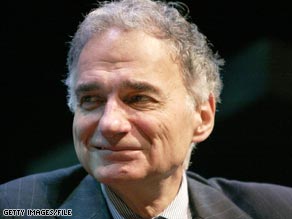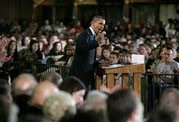 Clinton to Endorse Obama this Saturday:
Clinton to Endorse Obama this Saturday:It's official- Barack Obama will be the Democratic Party's nominee for president. After months of deliberation and a heart-wrenching primary season, Obama will receive the formal rndorsement of rival Hillary Clinton this Saturday in a speech to take place at a yet to be disclosed location in the nation's capital.
Clinton, who has captured the votes of more than 18 million people, is widely rumored to be positioning herself for a spot on the Obama ticket, and no sooner had she announced her coming withdrawal from the race than political pundits had already intensified their speculation regarding the likelihood of the so-called 'dream ticket'.
Earlier Wednesday, Obama formally announced the hiring of a three-person committee to oversee the vetting process of selecting a running mate. They consist of Caroline Kennedy, the daughter of the late U.S. President John F. Kennedy, to whom Obama has received no shortage of comparison, former Deputy Attorney General Eric Holder, and party insider Jim Johnson.
With Clinton having announced her withdrawal from the nominating contest, the Obama Campaign's focus shifts immediately to uniting a Democratic Party that, for nearly 18 months, has been at odds over who would be the best person to lead the country.
Selecting Clinton as his running mate would go a long way in helping Obama to quell any lingering disgruntlement amongst the former First Lady's backers, who have become increasingly frustrated by their candidate's fall from front-runner status, as well as offer Obama powerful assistance in reaching out to women, Latino, and blue-collar voters, amongst whom Clinton performed better during the primary season.
Still, selecting Clinton certainly raises several question marks. First and foremost, a longtime Washington insider, Clinton's ties to party power brokers and establishment figures runs afoul of the theme of change, freshness, and a new hopeful approach upon which Obama has premised his campaign.
Secondly, tapping Hillary brings with it not one, but two Clintons, as former President Bill Clinton would surely want and demand a significant role, were he to find himself back in the White House. While millions of Democrats look back longingly on the former Commander In Chief's two terms in office, his performance and conduct during the primary campaign has left much to be desired and, at times, cast made the former front-man out to be bitter, out of touch, and, simply, tired. Bringing this Bill back into the White House runs counter to the new face Obama wants and needs to bring with him to 1600 Pennsylvania Ave.
If not Hillary, than whom? Well, I've given you a little hint in a prior posting, as well as the final sentence of the previous paragraph, but musings on nominee Obama's running mate will come in a more detailed form at a later date. The focus of this hour is and must be Obama's having finally secured the primary triumph and his initial preparations for the looming battle against McCain.
In offering first-hour prognostications on the general election and the key factors, figures, and states that will decide it, I can think of no one better to whom to turn than my brother Patrick, a blossoming young progressive activist and commentator in his own right. I had not even learned of Hillary's coming concession, when I received a Word document from my 14-year-old bro with his thoughts on the state of the race, both as it stands now and as it will stand after the final ballot has been counted.
Below, find Patrick's intriguing and, I think, compelling predictions on general election '08, and, remember, this is just the beginning! The Democratic primary may (finally) be over, but the political mish-mash that will comprise the coming contest for the White House has only begun. Stay tuned for the freshest, most progressive look at all campaign happenings on the New Mexico Progressive, where we offer you the unadulterated perspective of young activists, committed to change and a more positive future for the people of the Land Of Enchantment and across the country and world. Stop back by again soon!
2008
Obama v. McCain
Part One
John McCain
McCain has a difficult task. He doesn’t have a sure base and his outreach to independents is countered by Obama’s even better outreach. Plus, he doesn’t have the money to compete in toss up states other than Ohio, Pennsylvania, and possibly Michigan. Some of the less delegate rich tossups he’ll probably have to cede to Obama.
Alabama (9)- Pretty strong red state
Alaska (3)- Very conservative state, but disdain for Stevens may turn AK into a tossup in following predictions.
Arizona (10)- McCain’s home state
Florida (27)- With Crist and Lieberman, a Democrat win would be a huge upset
Georgia (15)- Another solid red state
Idaho (4)- Despite Larry Craig, it will still be solid red this year
Kansas (6)- Pretty red, but with Sebelious, Obama may have a chance with the right amount of money
Kentucky (8)- Red as red can be
Mississippi (6)- Red as red can be
Nebraska (5)- More moderate than other red states, but it will be a tough state for Obama
North Carolina (15)- Part of the new Solid South
North Dakota (3)- If Kent Conrad and Byron Dorgan spend every waking minute until November 4th, Obama might have a chance
Oklahoma (7)- Conservative as Texas
South Carolina (8)- Solid Southern state
South Dakota (3)- TJ will win again, but Obamawilln’t have such good fortune
Tennessee (11)- Red as red can be
Texas (34)- BIG red state, but with enough money, Obama could score a moral win by pulling it within ten. I say 54-45 McCain.
Utah (5)- Mormons will turn out in droves with or without Romney
Wyoming (3)- Red western state
Total- 19 states (182 delegates)
Obama
Obama’s task is much easier. He’ll have sooooo many things going for him. A moneymaking machine, a winning message, a winning platform, and a big year for Democrats spell a huge victory. If Clinton makes the speech I want her to make on Friday and she works her heart out to sure up women and poorer whites, he’ll have a Reaganesque victory (My theory is, between McCain and Obama, Obama is the more Reaganesque candidate, with his ability to communicate and reach out across the isle; issues, that another thing altogether). Plus, he doesn’t really need a big effort by Clinton because of his massive volunteer organization that rivals the PLA (in size, porsupuesto).
California (55)- Big blue state
Colorado (9)- Rapidly turning blue and while it may be close now, Obama will widen his lead by November
Connecticut (7)- Big Dem Northeast state
Delaware (3)- Blue state
Hawaii (4)- No explanation needed
Illinois (21)- See Hawaii
Iowa (7)- He proved in his caucus win he can win these white states
Maine (4)- Very blue state
Maryland (10)- Obama will make this blue state bluer
Massachusetts (12)- He might not have won the primary, but he’ll win the general
Minnesota (10)- Obama will definitely win this state, but it’ll be interesting to see Franken v. Coleman.
Missouri (11)- Moving Democratic, I don’t think McCain will have the money to make a play for these states that are in the middle delegate wise
Montana (3)- Everybody thinks this is solid Republican, but I can’t see how it will vote for Max Baucus, Brian Schweitzer and John McCain at the same time.
New Jersey (15)- Despite HRC’s opinions, Obama will win this typically conservative state
New Mexico (5)- Obama will win this state with Big Bill at his side, but what’ll be interesting will be his impact on the local elections and how people like Harry Teague benefit from his candidacy
New York (31)- Again, despite its traditionally Republican roots, Obama will win a stunner in NY
Oregon (7)- Somehow, I think Obama will win this but Gordon Smith will win re-election
Rhode Island (4)- Big surprise here: RI has FOUR DELEGATES?!?!?!
Vermont (3)- If Dean can’t deliver this state, the Dems are in BIGGGGGG trouble
Virginia (13)- A microcosm of the entire race, it will be fun to watch how big the margin will be. Over or under 10 points (I say over)
Washington (11)- This list keeps going on and on. Yet another Obama win
Wisconsin (10)- Obama will win this state, despite his “troubles” with the working class
Total- 22 states (235 Delegates)
Toss-Up
These are states that I’m reluctant to label Dem or GOP (mostly Dem). With his money, I’m positive Obama will take many of these states of the list.
Arkansas (6)- Likely Democratic state, but that will depend on Clinton’s role in the campaign (Definite tossup)
Indiana (11)- Would be helped by a Bayh VP nomination, but that’s unlikely and a bad move in my book, but this disgruntled red state looks good for the Dems (Leans Dem)
Louisiana (9)- A blue state that could turn red if Jindal is the VP for the GOP (Leans Dem)
Michigan (17)- Gonna be a close one. While I’m pretty sure it’ll be blue, Romney is still popular here (Leans Dem)
Nevada (5)- I think Obama has the chance to form a winning coalition of Northern conservatives and southern Hispanics, but the Mormon population worries me (Tossup)
New Hampshire (4)- NH loves McCain for some reason. I have no idea why they support him. And yet, Sununu’s gonna lose. Go figure. (Leans GOP)
Ohio (20)- It all depends on Hillary’s embrace of Obama, how quickly they realize that McCain is in love with NAFTA, etc. (Tossup)
Pennsylvania (21)- Probably better chances for the Dems than in Ohio, but we’ll see on Friday when Hillary endorses Obama (Leans Dem)
West Virginia (5)- Byrd and Rockefeller will be a big help. Obama has the money to do it. (Tossup)
Total- 9 states (98 delegates)
Final Prediction
Obama- 305( I didn’t include DC in the summary above, but we know how it’s going)
McCain- 235 (I think it will be an embarrassment to the GOP that after such a long primary battle, they couldn’t win the election)
If my math is off, I apologize. My final predictions were including my predictions on tossups, if you hadn’t noticed.
Isn't he great, folks! At only 14, my bro is making predictions, the potential accuracy of which would knock the socks of those of many a seasoned political veteran. Kudos, Patrick, on your induction into the blogosphere, and may this posting be only the first of many forays therein!















